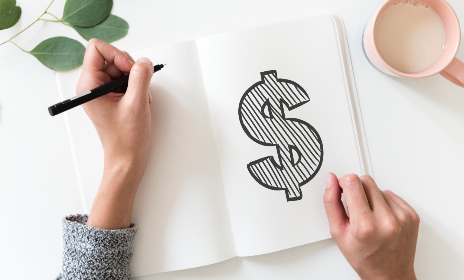Monthly Archives: January 2018
Budgeting When Your Salary Fluctuates
 An increasing number of people are entering the freelance world instead of a typical 9 to 5 job. The perks can be intoxicating – the flexibility to set your own hours and work from anywhere in the world. But there are some downsides too, including a lack of benefits and a fluctuating salary that makes budgeting a challenge.
An increasing number of people are entering the freelance world instead of a typical 9 to 5 job. The perks can be intoxicating – the flexibility to set your own hours and work from anywhere in the world. But there are some downsides too, including a lack of benefits and a fluctuating salary that makes budgeting a challenge.
But just because you don’t know how much to plan for each month in your budget, it doesn’t mean you can’t rock your finances as a freelancer. Here are some tips to get you started.
Try to Budget Within the Lowest Amount You Could Bring In
If there are months where you earn $2,000 and months where you’ve doubled that, budgeting can be tricky. One way to work around that is by budgeting as close to your lowest earning month as possible. If you do better, it’s like you’re winning a mini lottery each month.
Then if you get extra money, you’re not counting on it for anything – you can use it for extra debt repayment, to bulk up your emergency savings, or to throw into an IRA.
Don’t Forget to Make a Line Item for Retirement
While drafting your budget, you have to include an amount for an IRA. You won’t be getting a 401k from an employer and you won’t be earning a pension. That means you won’t have a dime saved for retirement unless you make it a priority in your budget.
You can start off small if your budget is already tight. Or you can throw any extra money you get in big-earning months straight into an IRA account you already have set up.
That Emergency Fund is More Important Than Ever
Emergency funds are the cornerstone of any solid financial plan. But when you’re a freelancer with a fluctuating salary, they are even more important.
As a freelancer, you won’t get paid sick days or vacation days. That means if you are working, you aren’t earning any money. So a bad bacterial or viral illness could cost you days in lost wages. You have to have money set aside to help you cover that.
It’s really not a matter of if you’ll face that situation, it’s a matter of when. It’s best to be prepared for when it happens than to try to scramble and modify your budget when it does.
List Your Expenses From Most Important to Least Important
On your budget, start by listing your most important expense, which will likely be your house payment or rent. You need a place to live after all.
Keep ranking their importance down to the last bill. Things like gym memberships and cable television service will be at the bottom of this list.
Pay Things Off In That Order
Your first check of the month should go to the most important item. You’ll use that check, setting a small amount aside for essential gas or groceries to get you by for the time being. But any meals out shouldn’t be planned until closer to the end of the month when you have a better idea of whether you can afford them.
After that first check is gone, use your next check of the month to pick up where you left off on your list. By the time the month is done, ideally, you’ll have worked hard enough to have extra.
Put the Debt Snowball Method to Work for You
 If you have a bunch of outstanding debts and you have no idea how to begin to pay them off, the debt snowball method might be your best bet.
If you have a bunch of outstanding debts and you have no idea how to begin to pay them off, the debt snowball method might be your best bet.
This method, made popular by financial guru Dave Ramsey, gives you a way to put momentum to work for you. If you can feel your efforts snowballing, you’re much more likely to stick with them.
Let’s take a look at how the debt snowball system works.
What Should I Do First?
The first thing you should do is get a complete list of all the debts you owe and what the minimum payments are for each one. Go old school and write it down in a notebook if you want. Or you can create a spreadsheet on the computer with that information where you can track your progress.
You should put every kind of debt you owe on this list – even the “good” kind like your mortgage. Put your car payment, personal loan, credit cards, and student loans on this list.
When making your list, put a star by the one you owe the least amount of money to – not the one with the highest interest rates on the debt. That’s the bill you’re going to start to pay off first.
How Do I Do It?
Once you’ve identified the debt you owe the least amount of money to, you can start to pay it off. Pay just the minimum payments on all your other debts and not a dollar more. The idea is to aggressively target your lowest bill because it will be paid off the fastest. That will make you feel great because you’ll see an immediate payoff for your efforts.
So while you’re paying only the minimum on your other debts, put every single dime you can toward your lowest debt. Any spare money you find should only go toward paying this bill off. You can cash in your spare change, sell some clothes you no longer wear, or only shop the grocery sales at the store for a few weeks.
You need to dive right in and pay that bill off as fast as you can.
Then What?
Once that debt is out of your way, you should start to focus on your others. Pick the debt with the lowest balance out of those remaining on your list. Then take all the money you were putting toward your first debt before paying it off and put it toward your new target.
When that debt is paid off – whether it takes months or years – you move onto the next one.
You keep targeting new debts as you pay off the old ones. When you get to the final debt, which may be quite sizeable if it’s a car, student loan, or mortgage, just remember it may take a while. Try not to get discouraged about how far you still have to go. Instead, think about how far you’ve come and how good you feel about what you’ve managed to accomplish with your finances.
Stay On Top of Your Dental Needs to Save Money
 Sometimes you have to spend a little money to save a bigger amount down the road. You don’t want a minor problem to spiral out of control. Suddenly you can find that a problem which would have taken you a couple hundred to fix will now set you back thousands.
Sometimes you have to spend a little money to save a bigger amount down the road. You don’t want a minor problem to spiral out of control. Suddenly you can find that a problem which would have taken you a couple hundred to fix will now set you back thousands.
Inactivity can be a terrible money habit. Even though you’re not actively spending money, it can wreak havoc on your finances.
Let’s take a look at how this applies to your dental needs and how ditching your dentist might put more sting in your pocketbook than it ever would have in your mouth.
Carry Dental Insurance
If you have a job with benefits, dental insurance is probably one of them. If you have any major dental needs, like needing a crown or braces, that dental insurance can save you a lot of money up front. Many dental plans cap out after $1,000 a year. But the premiums are so low for that insurance that even one cleaning may make up for the cost of carrying insurance for the year.
With most dental plans, you can get a cleaning every six months for free. That can help your dentist spot any pending problems they may be able to reverse, like gingivitis.
If left over the long term without any treatment or regular cleanings, gingivitis could eventually lead to tooth loss. That can become super expensive if you have to buy dentures to make up for the teeth you’ve let go.
But dental insurance only benefits you if you decide to use it. If you don’t, problems can get out of control quickly. A small cavity may cost you a tooth in the long run, not to mention a lot of pain.
Having a poor set of teeth can cost you in another way too. It can hold you back in job interviews. You can be so self-conscious about bad teeth that you end up not smiling at all.
Find a Dentist You Like
Some people realize the importance of keeping up with their dental care but they don’t do it anyway. That can happen because of a busy schedule. But it can also be the result of having a phobia about dentists. Some people are deeply terrified to step foot in a dentist’s office.
If you’re scared of going to the dentist because of some bad childhood experience, you need to remember that the dentist who caused you pain is the exception rather than the rule. Dentistry has come a long way in the past couple of decades and there are ways to avoid feeling any discomfort while you’re sitting in that dental chair.
Do Your Home Care Too
While you’re at the dentist, he’ll give you instructions as to what more you can be doing to protect your dental health. You should listen to him. You’re paying for that advice so make sure you heed it.
He’ll tell you to floss daily and to brush twice a day. That’s all good advice that can give you a great return on your investment.
